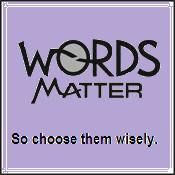 There is no consensus about ethnic titles. Is “African-American” an inclusive term, with the emphasis on “American”? Does “Mexican-American” create a divide just by using the “Mexican” prefix?
There is no consensus about ethnic titles. Is “African-American” an inclusive term, with the emphasis on “American”? Does “Mexican-American” create a divide just by using the “Mexican” prefix?
There is no consensus about adoption titles, either. Is the woman who gives birth but doesn’t parent a “birth mother”? A biological mother? Just a mother? Or is there some better term?
There is no definitive answer that ruffles no feathers. But let’s explore some commonly used titles.
- Birth Parents: Not accurate for a father — he doesn’t give birth. Too limited for many mothers — they contribute much more than labor and delivery. There’s prenatal care, and a loving, painful decision to place a child. Still, it is an understood and widely used term, not heinous to most first parents I hear from, and I occasionally use it to be understood.
- Biological Mother: limits my children’s first parents’ role to that of DNA providers. In fact, Crystal and Michele have much more significance than that to us. They made decisions during and after their pregnancies that show they are much more than egg donors. Just too clinical.
- Natural Parents: could imply that adoptive mothers are the opposite — unnatural mothers. Possibly an emotionally charged term, and could make it difficult for the child who wants to claim both his mothers.
- Real Mom: so who changed all those diapers and woke up in the middle of all those nights to sooth — Fake Mom?
I like first parent. It is clear. It honors the people who gave my children life. It does nothing to diminish my role in their lives — I’m their Mom. And I don’t believe it implies that I am second. Rather, it denotes that I am last. Roger may not have been my first love, but he was my last. Last is good.
No matter what your intentions, never abbreviate BM for birth mother. No one likes to be equated with excrement, no matter how innocent the intentions. Instead, if you are limited on keystrokes: bmom or bdad, fmom or fdad.
Please note that these terms are accurate only when referring to parents who have relinquished. Prior to relinquishment, a pregnant woman is simply an expectant mother (no matter what your agency tells you). Use of the term birth mother — even when prefixed with the word prospective — to describe a pregnant woman who might choose adoption is considered coercive. It’ s not until she legally surrenders her role as parent that she should have any prefixes attached to her title at all.
Excerpted from The Open-Hearted Way to Open Adoption.
~~~~~
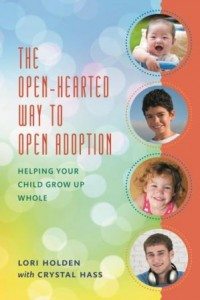 Lori Holden, mom of a teen son and a teen daughter, blogs from Denver. Her book, The Open-Hearted Way to Open Adoption: Helping Your Child Grow Up Whole, is available through your favorite online bookseller and makes a thoughtful anytime gift for the adoptive families in your life.
Lori Holden, mom of a teen son and a teen daughter, blogs from Denver. Her book, The Open-Hearted Way to Open Adoption: Helping Your Child Grow Up Whole, is available through your favorite online bookseller and makes a thoughtful anytime gift for the adoptive families in your life.

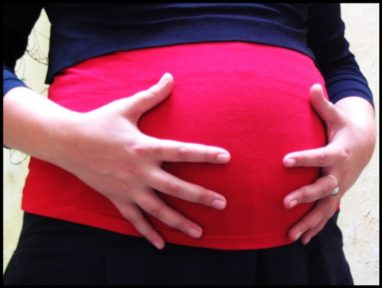
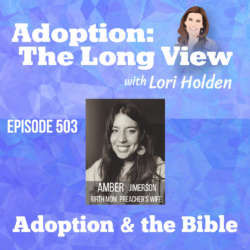
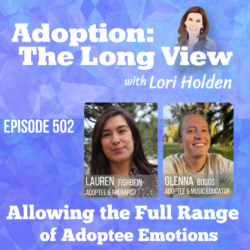
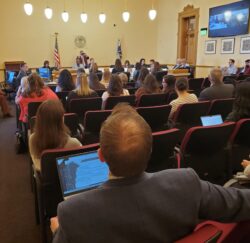
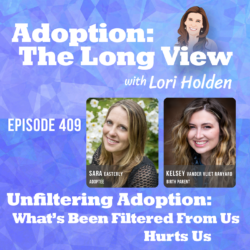

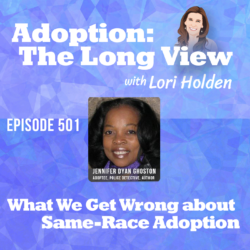

11 Responses
I find these posts SO helpful. It can all be very overwhelming, and with such a sensitive subject, with so much riding on it, you just don’t want to make a mistake. Thank you!
Thanks for this post, as we start the adoption process, it’s good to make sure I am listening for all of the things that can put us all more at ease.
thanks for the post. language is so important…for such an important topic, the right tools are a must.
Very interesting. I think I have been guilty of BM and I see how insensitive “birthmom” could be for someone who is still pregnant and undecided.In the world of donor eggs, I have seen “biological mother” describe woman who carried the baby and “genetic mother” describe the egg donor.
These posts are so interesting because the language has changed so much throughout the years. And I like that you pointed out that there isn’t a perfect term that everyone agrees on across the board.
Thanks, ladies for taking the time to comment.Kami, I hadn’t realized that donor communities would have their own vocabularies, too.Niobe, good point. It illustrates that even the presence of a prefix shows that one can be considered something less than a full mother.
What’s interesting to me is that the terms seem defined in some way by the complementary term. A woman who both gives birth to a child and parents that child could certainly be called a birthmom or a biomom. But either term would imply that there’s another mom out there somewhere as well.
I came back to revisit this post because I wanted to direct another blogger this way. I realized I never commented totell you that I thought this was a great post. It’s a tough topic. In general I don’t like “labels” but we do need to choose which ones we use and also be aware with which intent we use them.
This is a lovely, thoughtful post. From an adopted person, thank you!
I used “birth mother” in my book, Swimming Up the Sun: A Memoir of Adoption” but that was before I knew there were sensitivities around the subject. Now I usually use “original parents” or “original mother.” It’s like first mother but rolls more easily off my tongue. Cheers.
You can read the first three chapters of my book at NicoleJBurton.com/books
It’s also available on Amazon.com
From Miriam Webster’s Dictionary:
“Full Definition of parent
1
a : one that begets or brings forth offspring
b : a person who brings up and cares for another
2
a : an animal or plant that is regarded in relation to its offspring
b : the material or source from which something is derived
c : a group from which another arises and to which it usually remains subsidiary”
It has nothing to do with sharing their dna or giving birth because clearly a person shares dna with plenty of people who are not their parents. Siblings share dna, but one is not the other one’s parent. Food shares it’s dna with the eater but the food is not the parent of the eater. Fetus’ get the gestational carriers dna on them by occupying the inside of the carrier’s body their fluids are all over the fetus like a sneeze but that does not make the carrier the mother of the child when born. One person has to be the organic source of the other person’s body to be a parent.
That definition is not going away. It’s what doctor’s mean when they ask “do you have any children?” or “tell me about your mother’s medical history” or “is your father’s side of the family tall.”
It is a lie to refer to anyone other than someone’s creater as their parent without a qualifier.
Hi, Marilyn. I don’t understand your point. It seems like you are negating someone, but I can’t figure out whom.
You say this: parenting “has nothing to do with dna” — and also this: “It is a lie to refer to anyone other than someone’s creater as their parent.”
If you come back, please clarify.